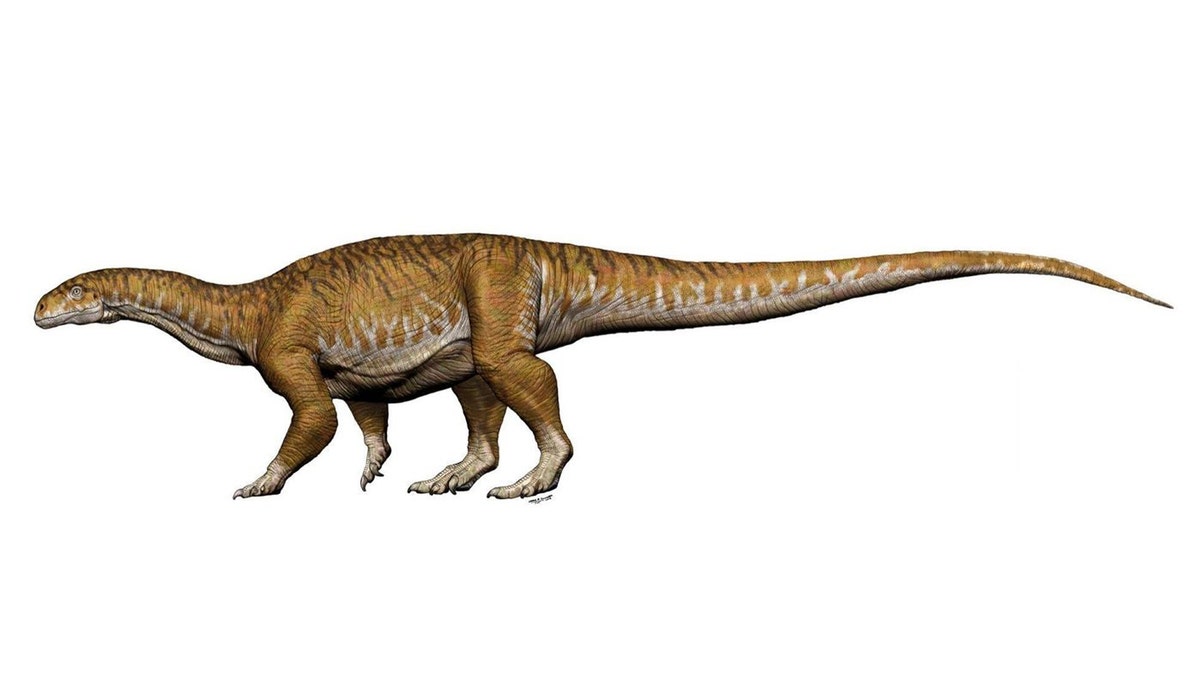
An artist's imagining of Ingentia prima. (Credit: Jorge A. González)
In the original "Jurassic Park" movie, Jeff Goldblum's character, Dr. Ian Malcolm says: "What do they have in there, King Kong?", making reference to the size of the dinosaurs in the park. If the fictional park had contained Ingentia prima, Dr. Malcolm wouldn't have been thinking big enough.
Fossils of newly discovered Ingentia prima (which means "great cousin") have been unearthed in Argentina. The animal is thought to have lived more than 200 million years ago, making it one of the very first dinosaurs to walk the Earth, according to the USGS.
"It was enormous," said lead researcher Dr. Cecilia Apaldetti, in comments obtained by The Daily Mail. "It was at least twice as large as the other herbivores of the time."
T. REX COULDN'T STICK OUT ITS TONGUE
The discovery is also important because it marks the first sign of "gigantism" seen in dinosaurs, some 30 million years before than previously thought, the researchers wrote in their paper, which has been published in Nature Ecology & Evolution.
"Although the origin of gigantism in sauropodomorphs was a pivotal stage in the history of dinosaurs, an incomplete fossil record obscures details of this crucial evolutionary change," Dr. Apaldetti and the other researchers explain in the study.
The fossil was found alongside the remains of three previously identified dinosaurs, known as Lessemsaurus sauropoides. It was discovered in the northwest part of Argentina's San Juan province.
The researchers estimate that Ingentia prima, a relative of Diplodocus, among the best known sauropods, was 33 feet long, 14 feet high and weighed approximately 10 tons. Other well-known sauropods include Brachiosaurus, prominently featured in the "Jurassic Park" movies.
For comparison purposes, the original version of "King Kong" was anywhere between 18 feet and 60 feet-high, depending upon the scene, according to The New York Post.
TERRIFYING 150 MILLION-YEAR-OLD 'MYSTERY' DINOSAUR SELLS FOR $2.4M
Dr. Apaldetti and her team noted that "the combination of well-developed pneumatic structures of the cervical vertebrae of Ingentia is unique among Sauropodomorpha." The dinosaur's bone structure shows that its limbs were bent, as opposed to straight or trunk-like. They also grew in small, intense spurts, allowing it to reach its final size.
Ingentia prima lived during the Late Triassic period, walking around what is now known as South America (specifically Argentina), approximately 210 million years ago.
Dr. Apaldetti added that prior to the discovery of Ingentia prima, "it was believed the first giants to inhabit the Earth originated during the Jurassic — about 180 million years ago. But with this discovery we can see the first steps toward gigantism occurred 30 million years before the giants dominated practically the entire planet."
Follow Chris Ciaccia on Twitter @Chris_Ciaccia